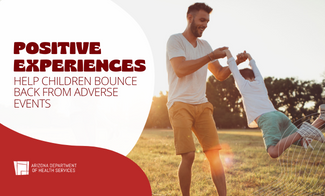 You may have heard about adverse childhood experiences, potentially traumatic events that could have lifelong health consequences.
You may have heard about adverse childhood experiences, potentially traumatic events that could have lifelong health consequences.
But there is increasing attention focused on positive childhood experiences that help children build resilience and recover from significant adversity or trauma. Researchers have noticed that children with resilience have better health outcomes and develop the ability to plan optimistically for their future.
The findings of studies about positive childhood experiences are important and promising, especially because most children experience at least one adverse childhood experience that can have lifelong negative health consequences.
A 2021 report from ADHS discovered that more than 43 percent of Arizona children age 17 years and younger experienced at least one adverse childhood experience. That ranks Arizona 44th in the nation.
This year, ADHS partnered with the Arizona State University’s Maternal and Child Health Translational Research Team to look from the opposite perspective, to learn about positive childhood experiences in our state. The resulting report focused on the following categories of positive childhood experiences:
- Having at least one adult mentor at school or within the community.
- Being able to talk with family members and work together on solutions during difficult times.
- Living in a neighborhood that is safe and supportive.
- Participating in after-school activities.
- Participating in community services or volunteer work at school, places of worship, or in the community.
- Sharing ideas and talking about things that really matter.
The report found that Arizona children had positive experiences slightly lower than the national average overall. The most-prevalent positive experiences were mentorship and family resilience. The least-prevalent were community service and having a supportive and safe neighborhood.
Positive experiences during childhood play a significant role in building resilience and mitigating disease trajectories followed by adversities. Children and their families are not only able to adapt to difficult situations, but also strive in the midst of adversities.
Although it is impossible to change the past, we can work toward shaping a better future for children and families and helping them strive in the midst of adversities.










